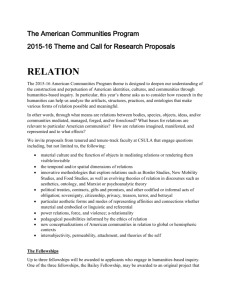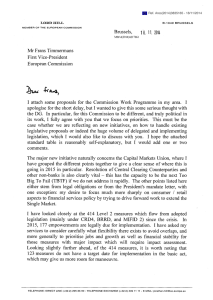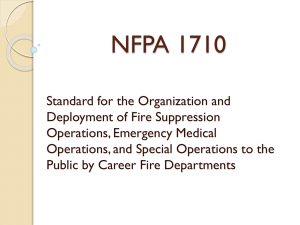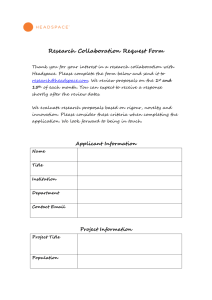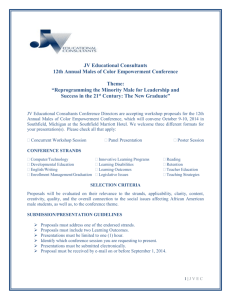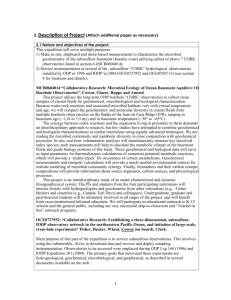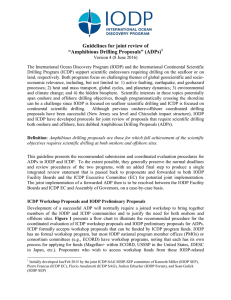C-DEBI Phase 1 - Request for Proposals
advertisement
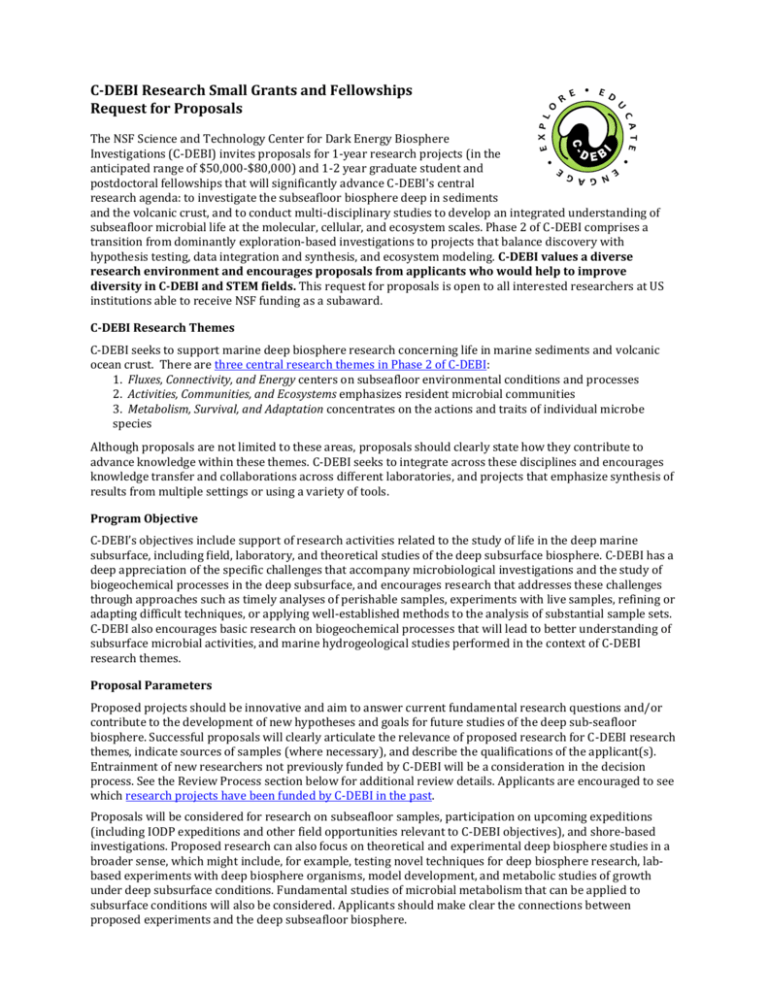
E • E D T E • C A E X P L O R U C-DEBI Research Small Grants and Fellowships Request for Proposals I • C- The NSF Science and Technology Center for Dark Energy Biosphere D EB Investigations (C-DEBI) invites proposals for 1-year research projects (in the anticipated range of $50,000-$80,000) and 1-2 year graduate student and postdoctoral fellowships that will significantly advance C-DEBI's central research agenda: to investigate the subseafloor biosphere deep in sediments and the volcanic crust, and to conduct multi-disciplinary studies to develop an integrated understanding of subseafloor microbial life at the molecular, cellular, and ecosystem scales. Phase 2 of C-DEBI comprises a transition from dominantly exploration-based investigations to projects that balance discovery with hypothesis testing, data integration and synthesis, and ecosystem modeling. C-DEBI values a diverse research environment and encourages proposals from applicants who would help to improve diversity in C-DEBI and STEM fields. This request for proposals is open to all interested researchers at US institutions able to receive NSF funding as a subaward. E N G A GE C-DEBI Research Themes C-DEBI seeks to support marine deep biosphere research concerning life in marine sediments and volcanic ocean crust. There are three central research themes in Phase 2 of C-DEBI: 1. Fluxes, Connectivity, and Energy centers on subseafloor environmental conditions and processes 2. Activities, Communities, and Ecosystems emphasizes resident microbial communities 3. Metabolism, Survival, and Adaptation concentrates on the actions and traits of individual microbe species Although proposals are not limited to these areas, proposals should clearly state how they contribute to advance knowledge within these themes. C-DEBI seeks to integrate across these disciplines and encourages knowledge transfer and collaborations across different laboratories, and projects that emphasize synthesis of results from multiple settings or using a variety of tools. Program Objective C‐DEBI’s objectives include support of research activities related to the study of life in the deep marine subsurface, including field, laboratory, and theoretical studies of the deep subsurface biosphere. C‐DEBI has a deep appreciation of the specific challenges that accompany microbiological investigations and the study of biogeochemical processes in the deep subsurface, and encourages research that addresses these challenges through approaches such as timely analyses of perishable samples, experiments with live samples, refining or adapting difficult techniques, or applying well‐established methods to the analysis of substantial sample sets. C-DEBI also encourages basic research on biogeochemical processes that will lead to better understanding of subsurface microbial activities, and marine hydrogeological studies performed in the context of C-DEBI research themes. Proposal Parameters Proposed projects should be innovative and aim to answer current fundamental research questions and/or contribute to the development of new hypotheses and goals for future studies of the deep sub‐seafloor biosphere. Successful proposals will clearly articulate the relevance of proposed research for C-DEBI research themes, indicate sources of samples (where necessary), and describe the qualifications of the applicant(s). Entrainment of new researchers not previously funded by C-DEBI will be a consideration in the decision process. See the Review Process section below for additional review details. Applicants are encouraged to see which research projects have been funded by C-DEBI in the past. Proposals will be considered for research on subseafloor samples, participation on upcoming expeditions (including IODP expeditions and other field opportunities relevant to C-DEBI objectives), and shore‐based investigations. Proposed research can also focus on theoretical and experimental deep biosphere studies in a broader sense, which might include, for example, testing novel techniques for deep biosphere research, lab‐ based experiments with deep biosphere organisms, model development, and metabolic studies of growth under deep subsurface conditions. Fundamental studies of microbial metabolism that can be applied to subsurface conditions will also be considered. Applicants should make clear the connections between proposed experiments and the deep subseafloor biosphere. Applicants who wish to use samples or data from IODP expeditions or C-DEBI field programs must ensure that their proposed projects do not conflict with existing expedition‐related projects (e.g., shipboard scientists’ projects). In cases where samples from field programs are needed, applicants should resolve this issue by contacting expedition leaders and shipboard scientists, to secure agreement to provide samples, before submitting a proposal to C-DEBI. Receiving research support from C‐DEBI does not guarantee access to samples or data that are not available to the community at large. For example, there is a moratorium period of one year for members of and IODP expedition science party to conduct drilling project‐related research before core samples and data are made available to the general scientific community. Applicants for C‐DEBI support are responsible for securing access to all samples and data needed to complete proposed work, and should provide evidence of access to the samples in the proposal. If working with IODP samples and/or data, Small Grant applicants should complete our IODP Sample and Data Access Form. For the IODP Sample, Data and Obligations Policy and other sample and data access information, visit http://www.iodp.org/access-dataand-samples. Application and Submission Research proposals should include an institutional letter of intent, a short project summary of ≤200 words written for a broad audience, a project description of not more than 5 pages (font size not smaller than 11 points) including a brief plan for making data public and accessible in accordance with the C-DEBI Data Management Plan, a separate bibliographic reference section, a detailed budget and budget justification including institutional overhead, NSF‐style 2‐page CVs of all participating researchers, and (if applicable) the C-DEBI IODP Sample and Data Access Form. In rare cases, we will consider awarding up to an additional $20,000 for research proposals, raising the total C-DEBI award limit to $100,000. Proposals requesting this additional amount must submit a separate explanation as to why additional funding is needed to complete proposed work (≤2 pages), with a separate budget and budget justification for the additional $20,000, indicating why the additional funding is essential and explaining how it would be used. Graduate Student and Postdoctoral Fellowship proposals should include an institutional letter of intent, a short project summary written for a broad audience, a project description including a broader impacts statement and a brief plan for making data public and accessible in accordance with the C-DEBI Data Management Plan, a proposal implementation statement (graduate fellowships only), a separate bibliographic reference section, a detailed budget and budget justification including institutional overhead, a NSF-style 2-page CV, a recommendation from the anticipated fellowship advisor, a second faculty recommendation (graduate fellowships only), the names of 3 references (postdoctoral fellowships only), and (if applicable) the C-DEBI IODP Sample and Data Access Form. Please see the fellowship guidelines for details on the graduate student and postdoctoral fellowship program including submission and budget requirements. Please submit proposals as a single PDF via our online submission form. The deadline for this call is January 31, 2016. Review Process Please see the detailed Grants Programs FAQs to learn how C-DEBI proposals are reviewed. Successful proposals will be clearly relevant to C-DEBI research themes and be rated highly based on scientific merit, potential impact, and tractability. We anticipate making decisions on funding by February 29, 2016 for successful proposals to start April 1, 2016. Contact Information For questions regarding this call, please contact: Julie Huber (jhuber@mbl.edu), C-DEBI Associate Director Questions regarding the data management plan can be addressed to: John Heidelberg (jheidelb@usc.edu), C-DEBI Data Management Director Questions regarding the fellowships broader impacts statement can be addressed to: Stephanie Schroeder (slschroe@usc.edu), C-DEBI Education Director Questions regarding proposal submissions can be addressed to: Rosalynn Sylvan (rosalyyl@usc.edu), C-DEBI Managing Director


